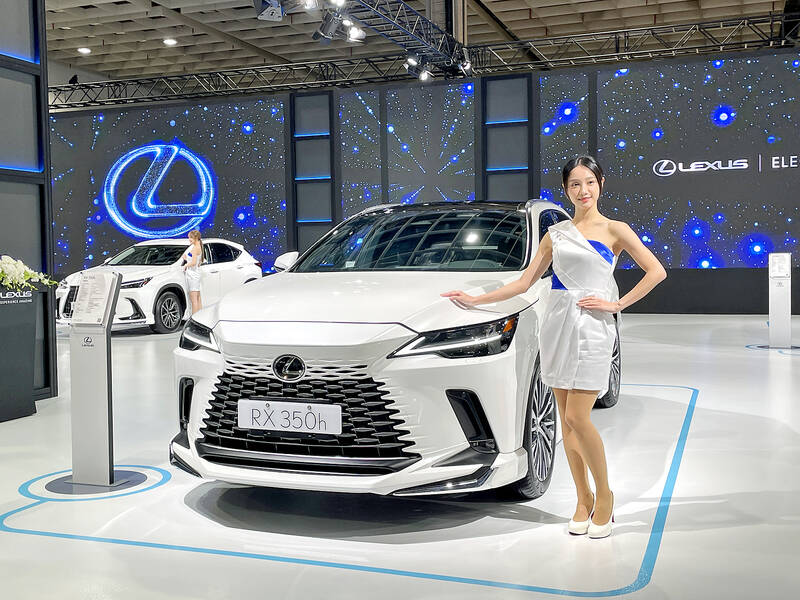New car sales in Taiwan last year rose 11 percent to the highest level in 18 years, government data released yesterday showed.
The number of applications for vehicle license plates, an indicator of new car sales, grew to 476,987 units last year, from 429,731 units in 2022, the highest level since 2005, when 514,626 units were sold, data compiled by the Ministry of Transportation and Communications showed.
The full-year results came as vehicle sales last month rose 3.1 percent year-on-year to 43,161 units, boosted by promotion campaigns by automakers and dealers coupled with new arrivals of imported models, the data showed.

Photo: Amy Yang, Taipei Times
Market leader Hotai Motor Co (和泰汽車), which distributes Toyota and Lexus vehicles in Taiwan, attributed the strong results last year to delayed orders from 2022 due to the COVID-19 pandemic and the easing of a chip shortage.
With most of the delayed orders fulfilled, the market is expected to return to normal this year, Hotai said in a statement.
Despite uncertainties related to the nation’s presidential election and tension across the Taiwan Strait, vehicle sales this month are forecast to reach 47,000 units, up 35 percent year-on-year with promotions ahead of the Lunar New Year holiday, it said.
The Lunar New Year, traditionally the most important holiday in the year, falls on Feb. 10 this year.
Hotai reported sales of 14,654 units last month and 159,175 units for the year, which was an 11.5 percent increase from the previous year and the highest in the company’s history.
It has been the No. 1 vendor in Taiwan for 22 consecutive years with a market share of 33.4 percent, Hotai said.
Among the top 10 brands, six reported sales growth last year, with Lexus posting the largest increase, at 55.6 percent to 30,065 units in annual sales, followed by Hyundai at 44 percent to 22,175 units, the data showed.
Toyota led the market, selling 129,110 units, up 4.6 percent from a year earlier, followed by Honda, with an 11.1 percent increase in sales to 30,420 units. Mercedes-Benz’s sales rose 4.5 percent to 24,439 units, while BMW’s sales rose 6 percent to 17,725 units.
In contrast, Nissan, Ford, China Motor Corp (中華汽車) and Mitsubishi reported declines of 5.8 percent to 12.9 percent in sales, compared with a year earlier, the data showed.

On Tuesday, US President Donald Trump weighed in on a pressing national issue: The rebranding of a restaurant chain. Last week, Cracker Barrel, a Tennessee company whose nationwide locations lean heavily on a cozy, old-timey aesthetic — “rocking chairs on the porch, a warm fire in the hearth, peg games on the table” — announced it was updating its logo. Uncle Herschel, the man who once appeared next to the letters with a barrel, was gone. It sparked ire on the right, with Donald Trump Jr leading a charge against the rebranding: “WTF is wrong with Cracker Barrel?!” Later, Trump Sr weighed

HEADWINDS: Upfront investment is unavoidable in the merger, but cost savings would materialize over time, TS Financial Holding Co president Welch Lin said TS Financial Holding Co (台新新光金控) said it would take about two years before the benefits of its merger with Shin Kong Financial Holding Co (新光金控) become evident, as the group prioritizes the consolidation of its major subsidiaries. “The group’s priority is to complete the consolidation of different subsidiaries,” Welch Lin (林維俊), president of the nation’s fourth-largest financial conglomerate by assets, told reporters during its first earnings briefing since the merger took effect on July 24. The asset management units are scheduled to merge in November, followed by life insurance in January next year and securities operations in April, Lin said. Banking integration,

LOOPHOLES: The move is to end a break that was aiding foreign producers without any similar benefit for US manufacturers, the US Department of Commerce said US President Donald Trump’s administration would make it harder for Samsung Electronics Co and SK Hynix Inc to ship critical equipment to their chipmaking operations in China, dealing a potential blow to the companies’ production in the world’s largest semiconductor market. The US Department of Commerce in a notice published on Friday said that it was revoking waivers for Samsung and SK Hynix to use US technologies in their Chinese operations. The companies had been operating in China under regulations that allow them to import chipmaking equipment without applying for a new license each time. The move would revise what is known

Artificial intelligence (AI) chip designer Cambricon Technologies Corp (寒武紀科技) plunged almost 9 percent after warning investors about a doubling in its share price over just a month, a record gain that helped fuel a US$1 trillion Chinese market rally. Cambricon triggered the selloff with a Thursday filing in which it dispelled talk about nonexistent products in the pipeline, reminded investors it labors under US sanctions, and stressed the difficulties of ascending the technology ladder. The Shanghai-listed company’s stock dived by the most since April in early yesterday trading, while the market stood largely unchanged. The litany of warnings underscores growing scrutiny of